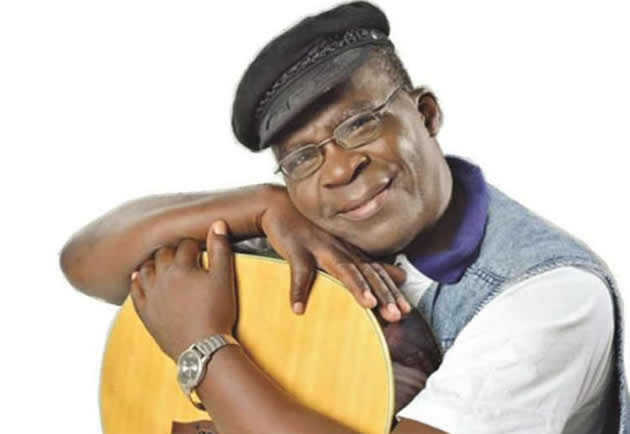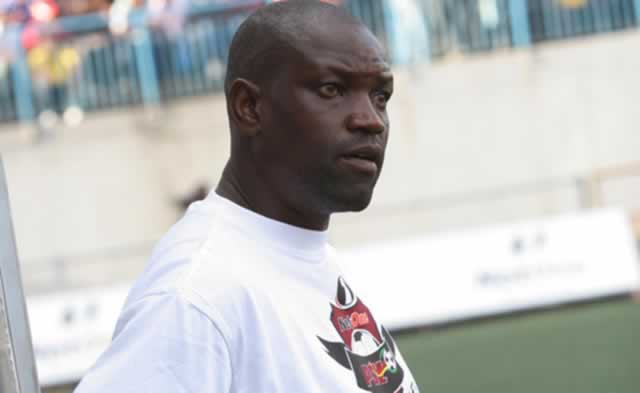Man with many talents

 Bob Nyabinde’s office at the Zimbabwe Film and Television School of Southern Africa complex on Mazowe Street is unabashedly a craftsman’s workshop. “The Headmaster” as he is nicknamed became famous with his song “Chabuda Hapana”. He has four albums under his belt and recently released “Mombe Yemavhu” which talks about the futility of living large when you own nothing. In his blue work-suit Bob is busy repairing Oliver Mtukudzi’s guitar. He speaks to Lifestyle Editor about his work and the industry.
Bob Nyabinde’s office at the Zimbabwe Film and Television School of Southern Africa complex on Mazowe Street is unabashedly a craftsman’s workshop. “The Headmaster” as he is nicknamed became famous with his song “Chabuda Hapana”. He has four albums under his belt and recently released “Mombe Yemavhu” which talks about the futility of living large when you own nothing. In his blue work-suit Bob is busy repairing Oliver Mtukudzi’s guitar. He speaks to Lifestyle Editor about his work and the industry.
MC: Not too many musicians are also craftspeople. What else do you do besides repairing guitars?
BN: I build guitars from scratch. I am the product of a teacher who valued inculcating survival skills not just passing exams. I attended Sakubva High School in Mutare and we all struggled to be in the A Class. I registered late and was put in B. I worked hard to get into the A class and qualified, but when the re-streaming exercise was done I still found myself in the B Class. I went to the head fuming and he referred me back to my teacher who told me that even if I failed academically the woodwork, which I has shown an aptitude for, would benefit me. I did not fail and I am using the skill.
MC: How did you get into the guitar making craft?
BN: In the late 80s musicians were crying about the cost of procurement and repair of electric guitars. One day I broke one open and was disappointed by its anatomy when I discovered that it was a simple item with just a few components inside. I made one, got Andy Brown to test it. He was impressed.
I also had another tested by Gilbert Zvamaida of the Zig Zag Band now playing with Thomas Mukanya Mapfumo and they all gave it the thumbs up. Oliver Mtukudzi has tested several and says they should be branded as the Binde Guitars. Others who have tried the Binde Guitar include Prayer Soul Mtamangira and the lead guitarist of Mukoomba-Trust Samende. I have also constructed speakers which are powerful.
MC: Jazz 105 is the venue that launched many careers in the genre. How has its closure affected the industry?
BN: Grossly and negatively. That was the home of jazz. When people said they would meet at Jazz 105 on Friday everyone knew what they were talking about. It was so conveniently and strategically located that someone arriving into town, even from the airport would stop over at Jazz 105 first.
MC: Is your music for a select elite?
BN: No, although we sometimes make that assumption. We were recently engaged to play in Kitsi Yatota. So I played Jiti thinking that I was fitting the music to the place and people. After we were done one gentleman in his work-suit came up to me and thanked me for a job well done. “But Mukoma Bob, hazvisirizvo zvandauya kuzonzwa. Yenyu music yacho ndiyo yandange ndichida kunzwa. (It was your jazz music that I wanted to hear)”. We played for an extra hour and a half as the people showed that they liked it.
MC: Zimdancehall, the music of the moment. From being dismissed as so much noise, now all generations are hooked. For example Winky D’s “Disappear” is known and loved by older people. Is Zimdancehall drowning out other genres?
BN: Who would not want their problems to disappear? So what if they reappear, but for the duration of the song you are in a happy place. That is the secret of the popularity behind Zimdancehall. It touches people’s lives.
In the beginning the artistes had challenges getting gig then they got a lot of airplay. It has been well and strategically marketed. But there is plenty of room for other genres.
It is all about cycles. Country music is still around but not as popular as it was in the hey days of Dolly Parton and company. Urban grooves had their time in the sun but are now mostly yesteryear hits. So we all embrace Zimdancehall.
But not everyone should do it. Let those with the talent rock it. Those who are inclined towards gospel, sungura and other genres should convince people that they are still there and can deliver.
MC: Every musician is crying about piracy. What can one do to mitigate the effects?
BN: With technological advances we can never totally eradicate piracy but the local law is too lenient on pirates. A $20 fine is not deterrent. International law says being in possession of one pirated song makes one liable for a $700 fine. If we applied that here across sectors people would stop because the punishment would just be too punitive. I have also taken to releasing singles. Like my latest offering “Mombe Yemavhu” is a single.
MC: Your lyrics have been described as being deeply philosophical. What is your composing process like?
BN: My lyrics are just come out, they are mostly anecdotal. Take “Chabuda Hapana”. I was travelling on a kombi from Mbizo to Redcliff. It stopped for a young man who would not make up his mind on boarding and kept on peeping inside.
One passenger recognised the fellow and asked where he was going and why he was holding everyone up and letting the whole kombi freeze. The young man replied, “Kubasa, sevamwe.” I found myself thinking of all the times in life when we just go along with the drift without making special efforts then wonder why we do not succeed like others.
MC: Is the National Arts Council of Zimbabwe delivering on its mandate?
BN: If we are satisfied we stagnate. So I think NAC should be happy about the areas that they have done well in like the concept of NAMA — I will not go into the actual event. But they need to do more. As artistes across genres we are not aware that we can walk into (NAC CEO Elvas) Mari’s office and ask what NAC is and can do for us.
Hats off to Jah Prayzah and Winky D for successfully proving that artistes need not rely on promoters but can arrange their own shows. Promoters had gone into a space where they overplay local artistes and overpay foreign artistes. By filling HICC Jah Prayzah has shown that locals are a force to reckon with.
MC: What about the ministry in charge of the arts?
BN: I think the arts are getting a raw deal from the responsible ministry. I am told that under the old one arts only got one percent of the budget with sports getting the lion share. As a country we only start to value our artists when they get international recognition.
The Bundu Boys played for years at Saratoga and only became local heroes after playing at Wembley. The ministry should work harder to convince parents that arts are not co-curricular activities.
We also need more robust talent scouting systems. Like football has all its tournaments which reach into the hearts of all Zimbabwe without side-lining rural and farming areas and has given us stars like Energy Murambadoro who came from Gokwe. I trained as a coach with the likes of Bhekimpilo Nyoni and produced names that went on to garner fame like Elasto Lungu and Benjamin Moyo, so I know what I am talking about.
Daves Guzha recently brought a school from Guruve to perform at Theatre in the Park in Harare Gardens and the audience which included ambassadors was blown away. How much such talent are we losing by not celebrating it?
MC: As a former teacher and an artiste, how far would you advise aspiring artistes to attain an academic education?
BN: I will give you an anecdote to respond to that one. I used to invite musicians to my school in Redcliff among them Jona Moyo and Steve Makoni. One day Tuku came by and one little boy asked what he needed to do so he too could be a superstar. Tuku told the young man to study as though his life depended on it.
“Tanga wafunda stereki so you will not be exploited,” he told the boy. Tuku said he himself had been prejudiced because he had not learnt enough to read the small print in a contract. You need a basic education to read contracts, plan, budget, invest and make different transactions.
MC: I saw a young man who resembles you when you were playing at Cresta Lodge last Friday at the Road Safety Journalistic Awards. Is he by any chance your son and can we expect another Nyabinde in music circles?
BN: Yes, that is my son Aggabu Tafadzwa Nyabinde. His own single “Mhiko” is about to be released.










Comments